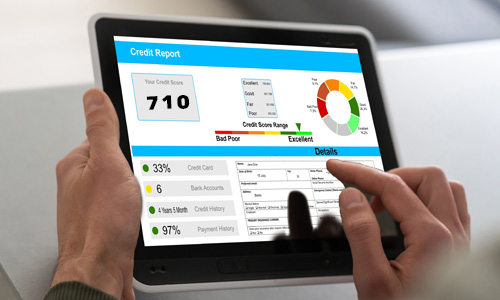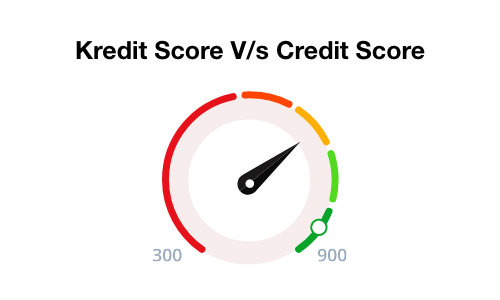How to Improve Credit Score in 30 Days in UAE?
Credit scores in the UAE are quite important — the approval of your loan or credit card applications as well as the applicable rates significantly depend on your score. A low score, as you may expect, can cause problems here.
Improving your credit score in the UAE, however, can be easily done in a few simple steps. By following a few strategies, you can easily enhance your credit score and history.
Read on to learn how to improve credit score in 30 days.
List of Factors Affecting Credit Scores in the UAE
Here are the major factors influencing a credit score in the UAE -
1. Bill Payment History
In the UAE, bill payment history plays a major role in determining your credit score. Constituting up to 35% of your credit score, this includes the payment made on credit cards, loans, mortgages, utility, and other bills. Note that the organisation looks into the past 5 years of your payment history.
A good payment history shows that you are reliable and can be trusted with credit. On the other hand, late payments or defaulting on bills can negatively impact your credit score, which can make it difficult for you to obtain credit in the future.
2. Credit Usage
Credit usage makes up around 30% of your credit score. Besides your bill payment history, the way you use credit in the UAE affects your credit score as well. If you use credit responsibly and keep your credit utilisation ratio low (credit used against the total limit), you can improve your credit score. However, if you max out your credit limits or have too many outstanding accounts, your credit score would be on the lower side.
3. Length of Credit History
The length of your credit history also has a massive impact on your credit score. Generally, the longer your credit history, the higher your score. This is because lenders consider longer credit history as a sign of financial responsibility and stability. A longer credit history also gives lenders a better indication of how you manage your finances. On the other hand, a short credit history can make it difficult for lenders to assess the risk of lending to you.
4. Number of Credit Card Applications
The number of credit card application requests that you make can have an effect on your credit score as well. Too many requests can be seen as a sign of financial instability. Moreover, whenever you apply for a credit card or loan, the concerned provider conducts a hard inquiry, which can reduce your credit score in UAE.
5. Credit Score Inquiry
Hard credit inquiries can have a detrimental effect on your credit score in the UAE. Whenever you apply for a loan or credit card, lenders will often conduct a credit inquiry to assess your creditworthiness. This inquiry will show up on your credit report and can lower your credit score. The more inquiries you have, the more likely it is that your credit score will be negatively impacted.
6. Existing Loans/ Debts
Your ongoing loans/ debts can have a major effect on your credit score. If you have taken out loans in the past and have been making payments on time, this will be reflected positively in your credit score. However, if you have taken out a loan and have not been making payments on time, this could have a negative effect on your credit score and make it difficult for you to obtain future loans. Additionally, having too many loans can affect your credit score.
Tips to Improve a Credit Score in 30 Days
Here are some of the major hacks if you are wondering how to improve a credit score in 30 days -
- Make Timely Bill Payments - The best way to improve your credit score in the UAE is to pay all your bills on time. This includes utility bills, credit card bills, and other types of debt. By repaying your bills on time, you can maintain your credit score and get the additional benefit of a well-managed budget as well. However, you should make sure to review your credit report and dispute any inaccurate information, as this can also reduce your credit score.
- Make Soft Credit Inquiries - Unlike hard inquiries, soft credit inquiries don’t reduce your credit score. They allow lenders to access your credit report without actually impacting your credit score. This information can be used to determine your creditworthiness for a loan or other form of credit, helping lenders better assess your risk profile. Soft credit inquiries are also beneficial for you as they show lenders that you are actively monitoring their credit and taking steps to improve your credit score. With this type of inquiry, you can easily find your credit score range without affecting your actual score.
- Clear Your Existing Loans and Debts - Clearing existing loans is an important step in improving credit scores in the UAE. Paying off existing loans on time shows creditworthiness and can increase the credit score. Paying off loans also reduces the amount of debt and can help improve the expenses-to-income ratio, which is a key part of a credit score. Furthermore, reducing the amount of debt can free up more money for other purposes and make it easier to meet financial goals. Clearing existing loans can also help you build a good credit history, which is another crucial factor as we saw earlier.
- Limit Your Credit Card/ Loan Applications - Limiting your loan and credit card applications can help you maintain your credit score in the UAE by reducing the number of hard inquiries on your credit report. Hard inquiries occur when a lender requests a credit report to assess the risk of lending to a person. Multiple hard inquiries can lower credit scores. By limiting the number of applications, however, you can reduce the number of hard inquiries and protect your score.
- Make Correct Credit Usage - While using your existing credit, you should keep track of your credit utilisation ratio, which is the amount of credit you are using compared to the total credit that you have. By being responsible with your credit card and keeping unnecessary expenditures in check, you can bring down this ratio. Another way to lower your credit utilisation is to get a new credit card, which can increase your available credit limit.
How to Check a Credit Score in the UAE?
The al etihad credit bureau is responsible for generating credit scores in the UAE for both individuals and companies. It gathers all the necessary details from banks and other financial institutions, analyses them, and releases a credit score.
However, in order to obtain a score or a credit report, you would be required to pay a certain fee for the same. For individuals, the fee for checking credit reports and scores is AED 84. On the other hand, for companies, the fee is AED 157.50 (both inclusive of VAT).
Here is the step-by-step process of how to get a credit report and credit score via AECB -
- Download the AECB app on your smartphone.
- Log into your account using your Emirates ID.
- Select ‘Credit Report’. Follow the steps and make the payment.
Note: Your credit report will be sent within 8 hours to your registered email ID.
You can also check your credit score via Policybazaar.ae. We have collaborated with AECB and allow you to generate your credit score without any charges.
Refer to the following instructions to learn how to check credit score for free via our digital platform -
- On our website - policybazaar.ae - go to the ‘Banking Products’ drop-down menu.
- Click on the ‘Check Free Credit Score’ option.
- Enter the required details and proceed with the on-screen prompted instructions.
- Once generated, your credit score will be sent to your registered email ID.
Policybazaar UAE: Helping you navigate the wilderness of the insurance world!
| Credit Score for different types of Loan | |||
|---|---|---|---|
| Credit Score for Personal Loan | Credit Score for House Loan | Credit Score for Car Loan | Credit Score for Student Loan |

More From Credit Score
- Recent Articles
- Popular Articles












